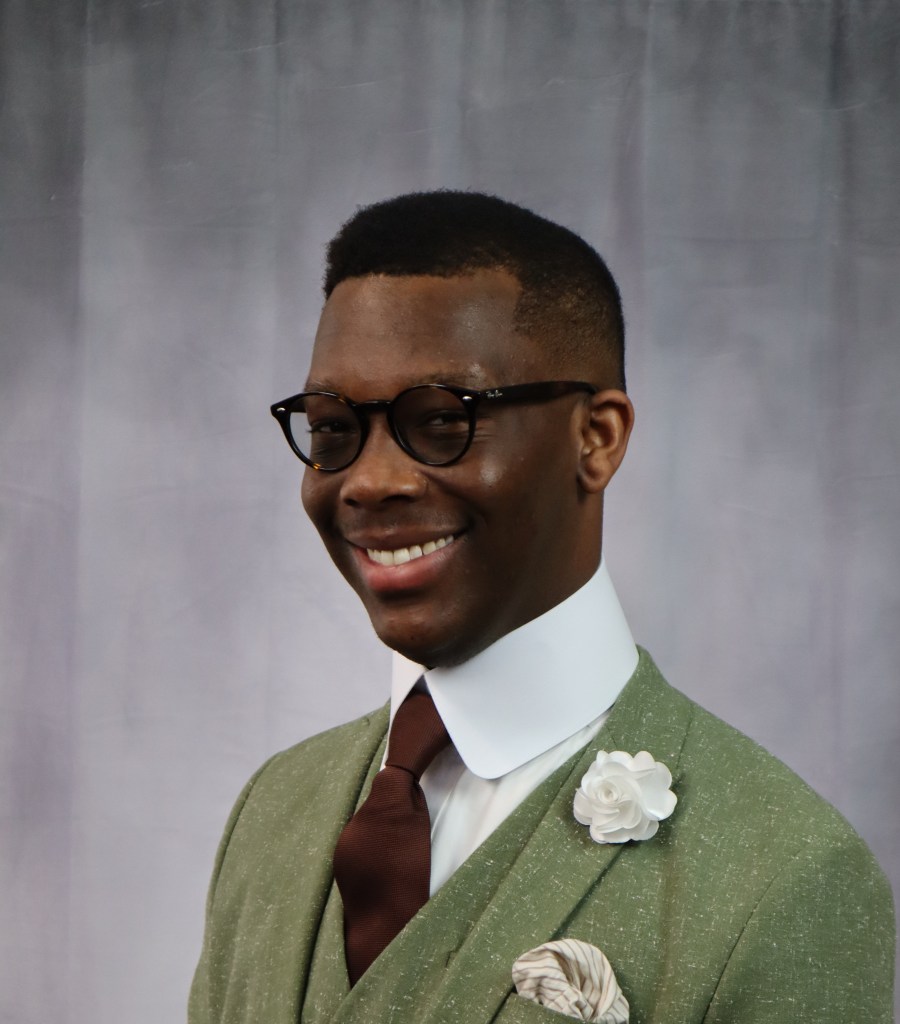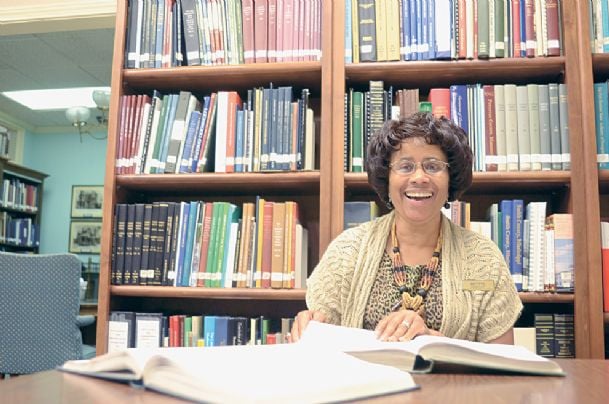Xavier Sivels, a PhD candidate in History at Mississippi State, won SMA’s first Distinguished Student Presentation award for his presentation, “Metadata Musical: Perspectives on Digital Archives Management,” at the 2022 annual meeting.
News
2022 Virtual Conference
Below is the schedule for SMA’s 2022 virtual conference, held on April 21-22. Slides and video links are listed beside each presentation where available.
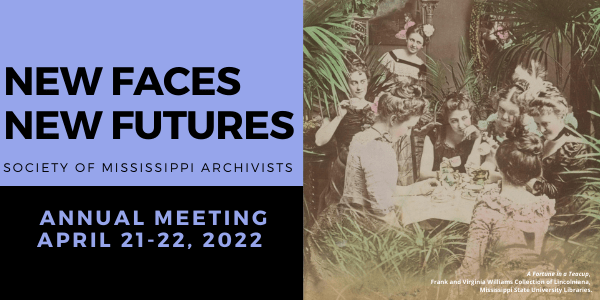
Thursday, April 21
8:30-9:00: Welcome from the SMA President (Mona Vance-Ali, Archivist, Columbus-Lowndes Public Library)
9:15-10:15: Session 1A – “Program Guide for Archives” (Victoria Patrick, MLIS Student, University of Southern Mississippi) Program Guide | Slides
10:30-11:30: Session 1B – “Gathering Collections for Underrepresented Groups in Your Archive” (Mandy Lawrence Hornsby, MLIS Student, University of Southern Mississippi) Slides
11:30-12:30: Lunch
12:30-1:30: Session 1C – “Reorienting Perceptions of Racism: A Case Study of the Equal Justice Institute’s Legacy Museum” (Rori Holford, MLIS Student, University of Southern Mississippi)
1:45-2:45: Session 1D (Panel)
“Descriptive Equity and Historic Sheet Music” (Jennifer McGillan, Coordinator of Manuscripts, Mississippi State University and Lauren Geiger, Metadata Librarian, Mississippi State University)
“Metadata Musical: Perspectives on Digital Archives Management” (Xavier Sivels, History PhD Candidate, Mississippi State University) – Winner of the Distinguished Student Presentation award
Friday, April 22
8:30-9:30: Session 2A – “Digital Collection Cliff Notes: Repackaging Research in a Virtual Environment” (Jennifer Brannock, Curator of Rare Books and Mississippiana, University of Southern Mississippi and Elizabeth La Beaud, Digital Lab Manager, University of Southern Mississippi) Slides
9:45-10:45: Session 2B – “Disaster Stories: Using The Stories of The Past To Influence The Present And Future” (Jeff Hirschy, Professor of Library and Information Science, University of Southern Mississippi) Slides
11:00-12:00: Session 2C – “New Faces, Old Materials: Engaging First Year Students in Archives and Special Collections” (Hali Black, First Year Experience Librarian & Learning Design Coordinator, University of Southern Mississippi) Slides
12:00-1:00: Lunch
1:00-2:00: Session 2D – “Pivot! Pivot! Engaging Primary Source Literacy through Semi-Virtual Game Experiences” (Autumn Johnson, Special Collections Librarian, Georgia Southern University) Slides
2:15-3:15: SMA Board Meeting & Closing Remarks (all SMA members are invited!)
Annual meeting program and registration
This year, our speakers were asked to present on the theme “New Faces, New Futures” – or how they envision the future of archives. We have an exciting slate of presenters who will give their talks over the course of two days. See the tentative schedule below.
Thursday, April 21
- 8:30 AM: Welcome from the SMA President, Mona Vance-Ali, Archivist, Columbus-Lowndes Public Library
- 9:15 AM: Program Guide for Archives, Victoria Patrick, MLIS Student, University of Southern Mississippi
- 10:30 AM: Gathering Collections for Underrepresented Groups in Your Archive, Mandy Laurence Hornsby, MLIS Student, University of Southern Mississippi
- 11:30: Lunch
- 12:30 PM: Reorienting Perceptions of Racism: A Case Study of the Equal Justice Institute’s Legacy Museum, Rori Holford, MLIS Student, University of Southern Mississippi
- 1:45 PM: Panel Discussion: Descriptive Equity and Historic Sheet Music, Jennifer McGillan, Coordinator of Manuscripts, Mississippi State University and Lauren Geiger, Metadata Librarian, Mississippi State University; Metadata Musical: Perspectives on Digital Archives Management, Xavier Sivels, History PhD Candidate, Mississippi State University
Friday, April 22
- 8:30 AM: Digital Collection Cliff Notes: Repackaging Research in a Virtual Environment, Jennifer Brannock, Curator of Rare Books and Mississippiana, University of Southern Mississippi and Elizabeth La Beaud, Digital Lab Manager, University of Southern Mississippi
- 9:45 AM: Disaster Stories: Using the Stories of the Past To Influence the Present and Future, Jeff Hirschy, Professor of Library and Information Science, University of Southern Mississippi
- 11:00 AM: New Faces, Old Materials: Engaging First Year Students in Archives and Special Collections, Hali Black, First Year Experience Librarian & Learning Design Coordinator, University of Southern Mississippi
- 12:00 PM: Lunch
- 1:00 PM: Pivot! Pivot! Engaging Primary Source Literacy through Semi-Virtual Game Experiences, Autumn Johnson, Special Collections Librarian, Georgia Southern University
- 2:15 PM: SMA Board of Directors Meeting, All SMA members and interested parties are invited to attend, especially those interested in leadership in the organization.
Dates for 2022 annual meeting
SMA’s annual meeting will be held virtually this year due to continuing risk from COVID-19. Join us on April 21-22! A schedule and registration link will be posted soon.
Distinguished Student Presentation Award
The Society of Mississippi Archivists (SMA) welcomes student presentations at our 2022 Annual Meeting, which will be held virtually on April 21-22. To celebrate excellence in student presentations, the SMA Distinguished Student Presentation Award recognizes an exceptional presentation by a student at the Society of Mississippi Archivists’ Annual Meeting. This honor is awarded to an individual currently enrolled in undergraduate or graduate studies with a desire to work in libraries and archives. The award recipient will receive a certificate and a $100 honorarium following the conference.
Presentations will be reviewed by a selection committee who will determine the recipient. In the event that none of the presentations meet the requirements of the honor, no award will be given this year.
To submit a proposal, go here. To qualify for consideration, please self-identify as a student under professional title.
If you have any questions, contact Jennifer Brannock at Jennifer.Brannock@usm.edu.
New Officers & Board Election
Congratulations to Mona Vance-Ali, who is now President of SMA, and to Carrie Mastley, who is now Vice President / President Elect! Thanks to Laura Heller for agreeing to continue serving as Secretary / Treasurer.
We now have three open board positions. If you are a member of SMA, please submit your choices in this poll by noon on Friday, April 23.
2021 Virtual Conference
Below is the schedule for the Society of Mississippi Archivists’ annual meeting on April 16, 2021.
Links to recorded sessions have been added below the graphic.
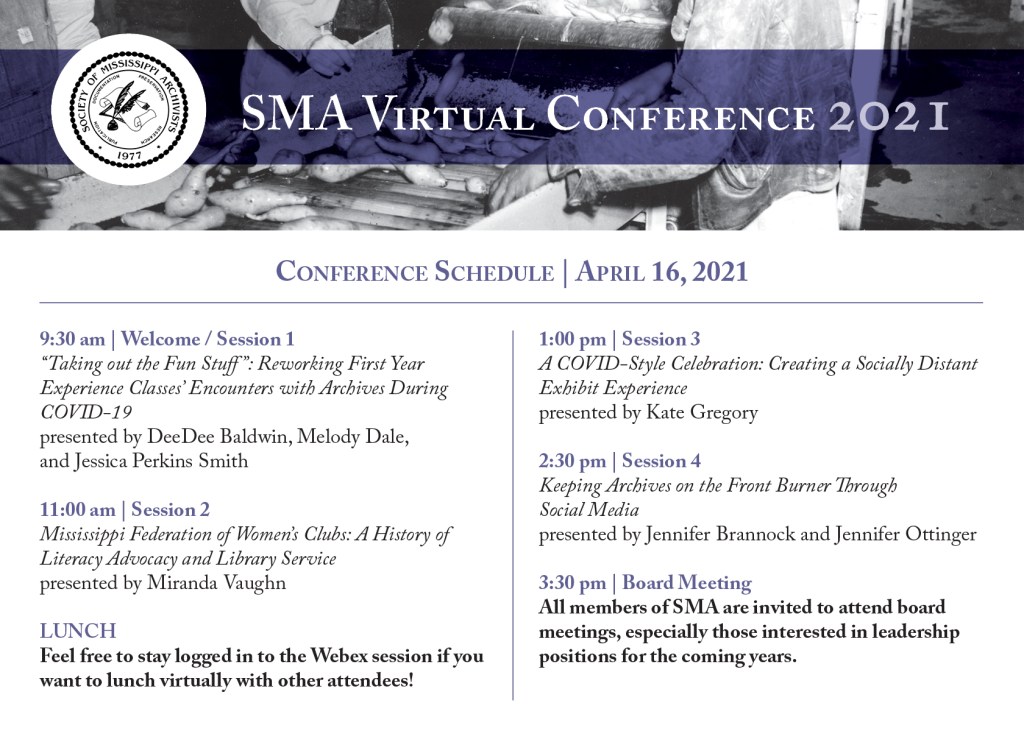
————————————————-
9:30 am – Welcome / Session 1 [watch recording]
“Taking out the Fun Stuff”: Reworking First Year Experience Classes’ Encounters with Archives During COVID-19 (DeeDee Baldwin, Melody Dale, Jessica Perkins Smith)
————————————————-
11:00 am – Session 2 [watch recording]
Mississippi Federation of Women’s Clubs: A History of Literacy Advocacy and Library Service (Miranda Vaughn)
This recording must be downloaded from Google Drive because YouTube won’t process it for some reason.
————————————————-
1:00 pm – Session 3 [watch recording]
A COVID-Style Celebration: Creating a Socially Distant Exhibit Experience (Kate Gregory)
————————————————-
2:30 pm – Session 4 [watch recording]
Keeping Archives on the Front Burner Through Social Media (Jennifer Brannock, Jennifer Ottinger)
————————————————-
3:30 pm – Board Meeting
All members of SMA are invited to attend board meetings, especially those interested in leadership positions for the coming years.
Failure of SB 2727
We are happy and relieved to announce that SB 2727, the bill that would have given control of the Mississippi Department of Archives and History’s board of trustees to the executive branch, has failed overwhelmingly in the House. Thanks to all of you who contacted your representatives and spoke up to protect the integrity of MDAH and historical instruction in our state.
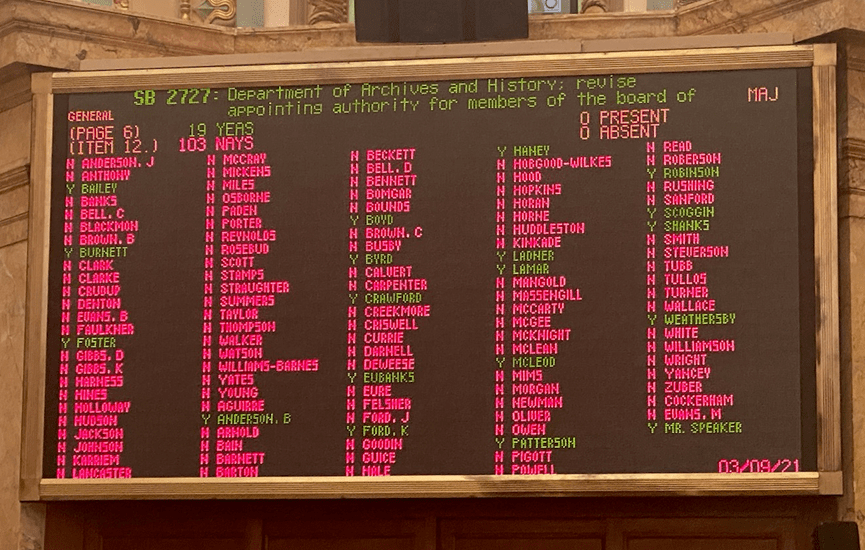
Recognition of Bettye Brown
The Society of Mississippi Archivists honors the life and service and mourns the February 21 passing of Bettye Brown, the Local History Assistant at Columbus-Lowndes Public Library’s Billups-Garth Archives. Since she began working at the archives in 2008, Brown helped untold numbers of patrons discover their family stories, worked on the development of print and digital resources, and assisted Mississippi School for Mathematics and Science students with their historical research projects. MSMS history teacher Chuck Yarborough wrote of her, “Her contributions to our students were contributions to our community’s future. We often say that we stand on the shoulders of others. A host of MSMS alums stand on Bettye’s shoulders, and she will be sorely missed.”
Mona Vance-Ali, who worked with Brown in the archives, said, “It was Bettye’s smiling face and dedicated work that helped make our repository a success. For thirteen years she assisted students, interns, and patrons with their research and projects. She leaves behind many fond memories. She was a colleague, but most importantly a friend.”
Bettye Brown’s work will live on through the lives she touched and the records she preserved for future generations. The Society sends its deepest condolences to her loved ones.
Statement on Mississippi Senate Bill 2727
The Mississippi Department of Archives and History (MDAH) was founded in 1902 and is the second oldest state archival program in the country. Though initially founded to protect the “Southern identity” and preserve records of the Civil War, the agency has expanded its reach and mission and now collects, preserves, and provides access to the many and varied archival resources of the state of Mississippi and is heavily involved in managing Mississippi’s historic landscapes and structures.
MDAH is currently run by a Board of Trustees composed of nine individuals drawn from across the state. Members are nominated by the Board itself and confirmed by the Senate. Senate Bill 2727 would strip this nominating power from the Board and transfer it to the Executive Branch of the State of Mississippi. The Society of Mississippi Archivists condemns this action in the strongest possible terms and urges members of the Mississippi House of Representatives to vote “no” on this action. We also urge Mississippi residents to contact their state representatives and share their concerns about the proposed course of action. That this action was proposed without any public notice before the Senate vote is particularly troubling.
Under its current configuration, with former Governor William F. Winter as President of the Board for fifty years and now Judge Reuben Anderson, the Board has worked in a nonpartisan way to preserve this complex history. Working together despite their own political differences, the Board successfully raised resources and support for a new Archives and History Building in 2003, followed by the Mississippi Civil Rights Museum and the Museum of Mississippi History in 2017, allowing Mississippi to not only be a destination for researchers, but also offering a place where difficult, controversial stories can be told by trained historians and archivists in a truthful way without concern for political fallout.
It is critical, now more than ever, that this work continue without political pressure. In 2017, just after the initial opening of the two museums, New York Times art critic Holland Cotter visited. Cotter was especially struck by the brutally honest approach to Mississippi history that the Museum’s curators took, explaining that “to a startling degree, and despite being a state-sponsored institution, the museum refuses to sugarcoat history.” We are also a state that just took a very small step out of this dark, racist past by finally changing the state flag in June 2020, in large part due to the potential major loss of revenue and financial support from entities like the NCAA and other organizations who threatened to pull events and funding from the state. We cannot go back. Placing the Board of Trustees in the hands of the Executive Branch invites significant politicization of the work of the agency and threatens to undo the good that the MDAH has done in telling the stories of this state in a candid, evidence-based way.
Mississippi is a state with a complex and difficult history that still struggles with issues of civil rights and racial justice. The ability to continue work in the preservation and accessibility of Mississippi history unencumbered by political interests is critical to the success of the mission of MDAH. The independence of the MDAH Board has been central to its integrity, and it should remain that way.
The Board of the Society of Mississippi Archivists
